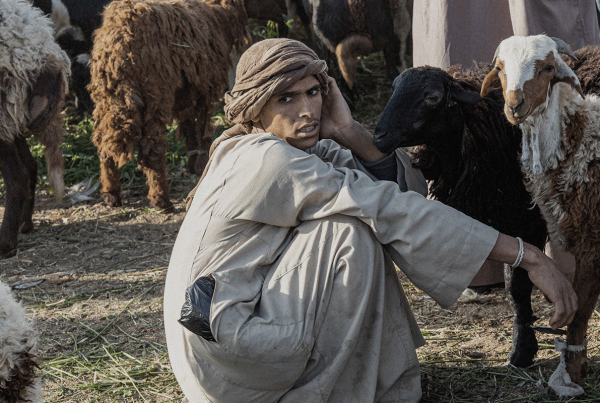Sometimes exploitation is so subtle, so unlike the stereotypical narrative of human trafficking, that the full reality of the abuse remains hidden — even from the person who experienced it. Isami Daehn was engaged in anti-human trafficking work when she first realized she’d been trafficked herself, by her mother. This is her story of surviving familial sex trafficking.
Trafficking under the cover of ministry
Isami’s parents were missionaries. Funded by an independent mission board, they moved around often — usually having to leave a location when her dad’s explosive anger damaged relationships within the churches where they worked. At the time of her exploitation, the family lived in Japan, ministering out of a church on the outskirts of a military base near Tokyo.
Isami and her sister were expected to be advertisements for her parents’ ministry, painting a picture of a model family.
“Everyone around us thought we were very spiritual, very godly,” Isami remembers.
Behind that facade, the family’s home life was a world of hurt. “There was abuse. There was a lot of neglect. There was a lot of marital problems between my parents. A lot of those things that they dealt with, they poured out to us as kids, even though it wasn’t our place as children to deal with adult issues,” she says.
“There was a difference between what people were seeing publicly and what was going on at home. There are a few friends who knew us back then, and since I’ve come forward, they’ve said ‘we always thought something was strange, but we didn’t realize the depth of the abuse.’ But it wasn’t their fault. They didn’t know.”
Ultimately, the peak of the abuse was Isami’s mom trafficking her to a piano teacher, giving him permission to sexually assault Isami as “payment” for piano lessons for Isami and her siblings. This exchange of sexual access to a child in return for money, goods, or services is frequently how familial trafficking looks.
The sexual abuse began when Isami was 9, and it continued for years. The perfect missionary mask was hiding horrific exploitation.
“For years, I had made excuses for my trafficker. I always said: ‘She loved me, she wouldn’t have known. She probably tried her best.’”
But the reality was that not only did Isami’s mom know about the sexual abuse she was experiencing — she was facilitating it. Isami says, “As a kid, I confronted her. Looking back now, I realize that what she did was blatant gaslighting. But from a child’s perspective, I thought my mom just didn’t believe me.”
Coming to terms with the truth
It wasn’t until many years later, when she was an adult, that Isami realized that what she had experienced was human trafficking.
“Things didn’t start clicking together until I was volunteering at a safehouse organization as their social media director,” Isami recalls. “I was training people to take on customer service. I explained the sensitivity behind what we talk about, and I shared my story. A volunteer came forward afterward and was like, ‘you know, what you just shared? That’s human trafficking.’”
The moment catalyzed a revelation for Isami. She worked backward, looking at her childhood with new eyes. The process was excruciating.
“I brought the conversation up in therapy and began processing what that would mean for me,” she says. “Does this change who I am? There was shame and guilt. How did I not understand this? What’s wrong with me?”
Isami found herself perpetuating the same self-blame that her trafficker — her mom — had instilled in her for a lifetime.
“It took me two years from that point to be like you know what? The truth is the truth. Regardless of what I knew back then and what I know now, it doesn’t change me. What was I going to do even if I did understand back then? I was just a kid. I had to make peace with that.”
Advocacy and solidarity: sharing her story
Once she’d made peace with the truth of her past, Isami began to share it. In 2021, she went public online about her experience as a trafficking survivor.
“I’d never really shared the extensiveness of what it felt like to be a familial trafficking survivor,” she reflects.

Isami Daehn, survivor of human trafficking, now speaks and advocates on behalf of others who have experienced familial trafficking.
It has been both painful and liberating. Her stories, which she shares on social media, have taken off, finding an audience who can relate. Now, Isami has cultivated a large following on Instagram and TikTok, where she shares authentic, destigmatizing, and hope-filled insights from her journey. She covers topics that range from hard-hitting trafficking facts to the daily realities of estrangement from an abusive family and the mental health ramifications of trauma. Her videos have moved a wide range of viewers to connect Isami’s experience to their own.
“The more I share, the more I realize there are thousands that have the same story I do.”
The mental cost of surviving trafficking
One of the reasons Isami’s story has gained so much traction on social media is because she shares about more than just the abuse and exploitation that she survived. She shares about the hard mental health journey she’s walked through as a result.
“I was 10 or 11, thinking ‘I don’t want to be alive anymore,’” Isami remembers. But she’d grown up in a religious culture in which talking about mental health was taboo. “I didn’t understand why I thought that way. I remember being uncomfortable in my own body when the sexual abuse started, feeling this constant fear of being seen by people. I remember that feeling of wanting to be invisible, hoping no one would notice me because if they noticed me they would think I was strange or that something was wrong with me.”
As a teenager, Isami’s attempt to cope with those thoughts burgeoned into a dangerous eating disorder. She lived trapped in undiagnosed anorexia, PTSD, depression, and anxiety, convinced by the culture around her that there was no reason to seek help.
In her 20s, finding herself in an oppressively dark mental place finally forced her into accepting care.
“This was before I realized I’d been sex trafficked. I ended up in a psychiatric facility for my own safety,” Isami shares. “I had no choice but to see a psychiatrist. That’s when my attitude shifted. I still struggle. I still have a psychiatrist, and I am on medication. I have complex PTSD, as well as severe anxiety and depression. But I understand that that doesn’t change who I am. And it doesn’t mean that there’s something wrong with my relationship with Jesus.”
Overcoming that stigma is an ongoing process for Isami, as it is for many survivors: “Sometimes, those past feelings of shame will come up. I just have to remember that that’s something I was taught, but it’s not true. Right now I’m pursuing truth, and that means we take our medication, and we get the help we need.”
Recognizing familial trafficking and getting help
When asked what she’d offer to those who might currently be in a trafficking situation and not be sure if what’s happening to them is wrong, Isami said: “Something that has really opened my eyes and brought a lot of healing is my sister and her relationship with my nephew. My nephew is 11, and I was that age when all of this was going on. If my sister did that to my nephew, how would I react? I would be very angry and very protective of my nephew.”
She continues, “If you look at it from that perspective, if you’ve experienced trafficking as a child, would you do that to your own kids? If the answer is no, there might be something to revisit.
“Even if you have a best friend or coworker who was telling you, ‘my significant other has been having strangers over and I’ve been having to do things I don’t want to do because they owe them money, or they need money for rent, or we need money for groceries’ — if your coworker or best friend told you that, would you be on the phone with the domestic hotline, or would you ignore it? The answer is probably the first one. If it’s happening to you? It’s no different.
“We make so many excuses because there’s trauma bonding. We might feel sorry for them, that they had been abused too. While being abused is never anyone’s fault, if someone is now abusing you, it doesn’t matter what their background is: it’s not OK. Don’t approach this by yourself. Please seek help. I know it can be scary, but there are people that will respond well and positively to you.”
When asked about what people around her when she was a child had missed, what they could have noticed if they’d known what to look for, Isami told this story: “I was a preteen, and I went to a friend’s house for a sleepover. I wet the bed. That was still happening at home, too. Sometimes people don’t realize that yes, there are circumstances where that may be a health issue, or someone who is neurodivergent might have difficulty using the restroom at night. But for me? It was directly linked to sexual abuse. Because of that, I wet the bed and had accidents well into my teen years.”
Isami went on to share a few more signs: “If a kid is terrified to ask for water or a snack. If they’re scared to ask to go to the bathroom — that’s a red flag. It’s this genuine fear of asking for anything.”
If you or someone you know might be experiencing trafficking, Isami recommends Polaris as a resource, which operates the National Human Trafficking Hotline. You can call 1-888-373-7888, text 233733, or live chat if you’re in trouble. She also recommends the healing work survivor leader Sandy Storm is doing. And you can follow Isami herself on Instagram, TikTok, and Facebook.
Isami is in the continual process of therapy, of recovery, of defining herself as so much more than the worst things that have happened to her. Her strong voice is a light that dispels the shadows of shame that surround familial trafficking.







